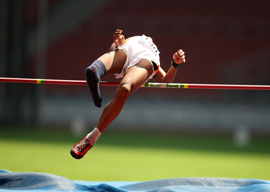
September 07, 2012

The same thing happened to Ukrainian discus thrower Maria Pomazan, who was asked to return her gold medal after officials decided a woman who was more crippled than her deserved the medal even though Pomazan had thrown it farther. She appears to have boycotted all proceeding events and has yet to return the medal.
The biggest controversy this year was when world champion “Blade Runner” Oscar Pistorius of South Africa lost his temper after being creamed by Brazilian underdog Alan Oliveira and exclaimed, “I don’t know how you can come back, watching the replay, from eight meters behind on the 100 to win. It’s absolutely ridiculous.” His complaints also included, “We”re not running in a fair race. I can”t compete with Alan’s stride length. His knee heights are higher than they should be.”
These were strange statements to make considering: a) Pistorius is taller than Oliveira; and b) Pistorius was the guy who fought to get blades in the real Olympics and was accused of having an advantage when he did so. (Also, if he’s “superhuman,” why didn”t he win?)
When I went to the Games last Friday I was prepared to see a bunch of fake applause for a mishmash of cripples who were pretending to be athletes. The first thing we saw was discus throwing, and it appeared the contestants were all dwarfs. As they came out into the stadium I started counting them and was very relieved when the total number stopped one short of seven.
These “athletes” were terrible. Two of the dwarfs couldn”t even get their normal-people-sized discuses past the safety net a few feet in front of them. After this we saw the women’s wheelchair 100-meter dash, and it was the opposite of the tossing dwarfs. It was fast-paced and exciting, and every woman appeared to be equally handicapped. I had my head in my hands during the Six Dwarfs, but I was on my feet during the wheelchair sprint.
That’s when it hit me: The Paralympics is just like politics. When you let the free market reign, the cream rises to the top. But when you conjure a tangled web of conditions in the name of forcing everyone to be equal, you end up with a pathetic, depressing mess. Politics, the economy, and sporting events are best when people are judged on their merit alone, free of bureaucracy.
While watching these women race down the track, I became angry with the dwarfs and their handlers. Like affirmative action, creating fake advantages with even faker applause trivializes the real winners” accomplishments. If you”re not up to snuff or if you”re not equally as handicapped as your competitors, you can”t compete. Sorry. To try and invent rules that say otherwise begs for those rules to be broken. Back in 2000 at the Sydney Paralympics, Spain realized they could fake being handicapped and took home the gold. It remains one of the most scandalous hustles in sports history. In a world where top chemists are employed to detect microscopic amounts of performance-enhancing drugs, you can”t have simple IQ tests determine an athlete’s ability and assume they”re going to answer honestly. That’s retarded.
British Paralympian Marc Woods says that untangling all these rules would mean the end of the Games:
If you start cutting events then it would be very difficult to start getting them back in because people train for them and if they stop the standards would just get lower.
I don”t think the standards could plummet any lower than all the points controversies that plagued this year’s Games. The Paralympics has a good thing going for the most part. To sully it with an overly complex points system that is more demeaning than truly inclusive ruins the whole thing. It’s good to be kind to those less fortunate than us, but when everyone gets a medal, nobody wins.
Photo of handicapped high jumper courtesy of Shutterstock